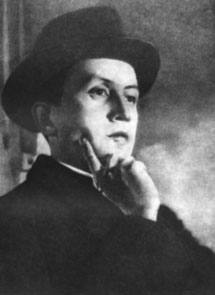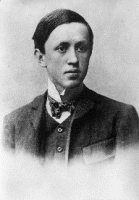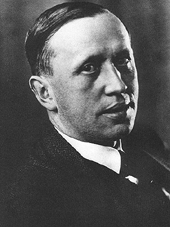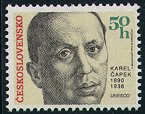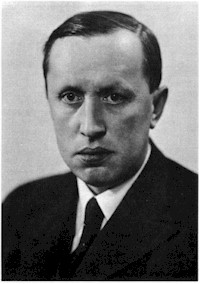 Karel Capek is a Czech author, playwright, journalist and translator. He was the first Czech writer to become recognized worldwide.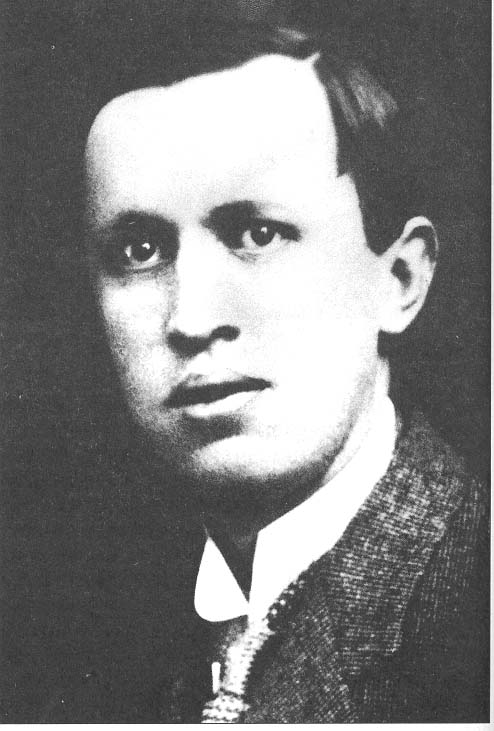 Arthur Miller on Karel Capek: "There was no writer like him... prophetic assurance mixed with surrealistic humour and hard-edged social satire: a unique combination"
|
Karel Capek was born on Jan. 9, 1890, in Male Svatonovice near Trutnov in Northeastern Bohemia and he died Dec. 25, 1938, in Prague. His father, Antonin Capek, was a doctor. His mother, Bozena Capkova, was a homemaker.
In the time preceeding the Nazi occupation of Czechoslovakia he used all his influence and connections trying to help save his country from the iminent danger of an attack. He fought until the end of his life, unfortunately in vain, to warn the Western powers to help ward off the threat of the rising aggressiveness of Nazi Germany. For this and other reasons, Karel Capek is beloved by most Czechs and Slovaks.
Young Capek
Karel Capek was the third and last child born into the Capek family. He had an older sister, Helene, and an older brother, Josef.
1895-1900
Capek goes to elementary school in the town of Upice.
For two years he went to a local middle school.
1901
In the fall, he moved with his grandmother to Hradec Kralove, the principal town of Eastern Bohemia, where he attends junior high school and the first two years of high school.
1905
In the summer Capek is expelled from the high school for taking part in an illegal students club.
In the fall Capek moves to Brno, where he lives close to his sister, Helena.
1907
He stays in Brno for two years and moves to Prague along with his parents, where he starts the final two years of high school at the prestigious Academic High School in the fall.
1909
Capek graduates with all A's in June.
1909
In September Karel Capek and his brother, Josef, go to Munich, where they stay for a month.
In October, Karel Capek signs up at the Charles University of Prague for courses on philosophy.
1910
Capek goes to the Friedrich Wilhelm University in Berlin.
1911
The first half of his third year of his University studies takes place at the Charles University, the other one at the Sorbonne of Paris.
After the end of the semester there, Capek travels a bit around France and returns to Prague, where he continues studies for three more years.
1915
On Nov. 29 Capek graduates as master of philosophy.
The same year, Capek isn't enlisted to fight in World War I because of back problems, which followed him throughout his life.
Early works
1917
Capek becomes a member of the board of editors of the Narod (Nation) magazine.
Along with his brother, he becomes an editor of the cultural section with the Narodni listy (the National paper).
Both brothers work at the satirical weekly Nebojsa (the Unafraid).
Capek along with his brother and some other editors resign in protest of the paper's politics.
Capek publishes his first important work, a play called R.U.R., which stands for Rossum's Universal Robots. In this play Capek first used the word "robot," invented by his brother, Josef, from the verb "robotovat," archaic for working.
1920
Capek makes acquaintance with Olga Scheinpflungova, an actress who would become his wife.
1921
In April Capek and his brother become editors of Lidove Noviny (The People's Paper).
In September Capek becomes a dramatic adviser to the prestigious Kralovske Vinohrady Theater. Olga Scheinpflungova performed in this theater.
1922
Capek meets with the president of Czechoslovakia, Tomas Garrique Masaryk, whom he soon befriended.
In August, Capek threatens to resign from the dramatic adviser post in protest of actor rehiring by the National Theater, the best Czech theater of that time. The situation improves, and Capek stays.
In November Capek moves to a bigger flat where he now lives alone. It is at that time that the tradition of meetings of intellectuals of all opinions on Fridays at Capek's place is born. It went on until Capek's death.
1923
In April Capek resigns from the dramatic adviser post and goes on a two-month medical visit to Italy.
1924
In April Capek's mother dies.
Capek visits England in June and July at the occasion of the Penclub conference and the British Imperium Exhibition.
1925
In January Capek sets up a committee that will help set up the Czechoslovak Penclub.
In the same month Capek visits Tomas Garrique Masaryk at the Prague Castle, the Czech presidential residence. He is elected the chairman of the Czechoslovak Penclub in February.
In May Capek is elected to the Czech Academy of Sciences, but soon resigns.
In September, both Capek and his brother, who is by that time a well-known and respected cubist artist, enter the newly established National Workers Party, he runs for a seat in the parliament, but the party fails, doesn't get a single seat and ends in a few years.
1926
During the summer holiday, Capek stays at the presidential summer residence in Topolcanky, Slovakia. On New Year's Eve, Capek organizes a party in the presence of President Masaryk in which he satirizes the Czech political scene.
1927
In July, Capek takes part in Czech writers' tour to Paris, where he meets with France's cultural and political elite. He stays at the presidential residence in September and October.
On Oct. 28, on the Czech Independence Day, Capek and his brother get the Czech national award for drama for the play Adam Stvoritel (Adam the Creator).
1928
Capek publishes the first part of the series of interviews with the president called Talks with Tomas Garrique Masaryk.
1929
Capek's father dies in April.
The 1930s
1930
In June Capek gets elected into an advisory board for the affaires of the National Theater.
1931
In January Capek is elected by The Committee for the development of mental cooperation by the Society of Nations, the predecessor to the UN, into the Committee for literature and arts.
He is re-elected chairman of the Czech Penclub in March. Capek takes part in a worldwide conference of Penclubs in The Hague, Holland, then travels around Holland.
In July, Capek takes part for the first time in the Committee of the Society of Nations.
Capek also publishes the second part of the Interviews: Part 2: Life and work.
1933
In February Capek starts up a huge discussion in the cultural press about the nature and function of critique.
In March, Capek resigns the Czech Penclub chairmanship.
1934
In November Capek signs a Czech writers' petition against organized Nazi disturbances.
1935
In June at the worldwide Penclub conference in Barcelona, Spain, Capek gets nominated for the worldwide Penclub chairmanship by the standing chairman, H.G. Wells, but Capek immediately resigns.
In the summer Capek participates at an international conference of writers' organisations for the defense of culture in Paris.
In July Capek travels to Italy to the Dolomites, where he asks Olga to marry him. Capek and Olga Scheinpflungova get married in Prague on Aug. 16, 1935.
In October, Capek gets nominated into the committee that awards the State Prizes for literature.
1936
Capek takes part in a Symposion organised by the Committee by the Society of Nations in Budapest.
In November the Norweigan press nominates Capek for the Nobel prize for literature.
The year 1938
The German nationalists started in coordination with Hitler civil unrest in the border regions. Germans infiltrated the border and attacked Czech police and army. Hitler demanded better treatement for the German minority in Czechoslovakia although the minority laws in Czechoslovakia were one of the best in the world at that time and definitely better than the German ones.
On September 30, France and Britain signed, along with Italy and Germany, the Munich treaty by which Czechoslovakia is ordered to leave the border regions to Germany. For that Germany will not attack the rest of Czechoslovakia. Czechoslovakia didn't participate. In March 1939 Germany invaded the rest of Czechoslovakia, thus breaking the Munich treaty.
In June, Capek participates at the World Penclub meeting in Prague. There he warns all the participants of the imminent German threat.
On Sept. 12, Capek writes the Czechoslovak writers' note to all the world in which they explain the Czechoslovak politics towards Germany.
On Sept. 30, Capek writes the Czech writers' memento To the Consciousness of the World.
In November, Capek is offered the possibility to leave the country and go to England into exile. Capek chooses to stay with the nation althoough he knows that after the Germans invade the rest of the country, he will be one of the first to be arrested.
In December, Capek suffers from heavy flu and inflammation of the kidneys.
Compiled from information gathered by Dominik Zunt.
